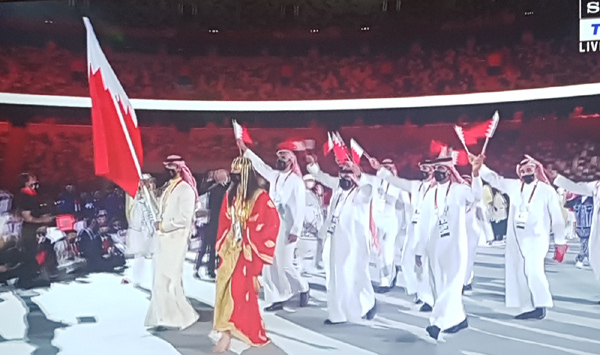
The Bahrain contingent at the opening ceremony
Tokyo Olympic Games begin amid Covid-19 concerns
TOKYO, July 23, 2021
The opening ceremony of the Tokyo Olympics was held on Friday night in a nearly empty National Stadium amid unprecedented challenges caused by the coronavirus pandemic.
The ceremony raised the curtain on the biggest sporting spectacle held since the virus took hold early last year and following a one-year postponement, said a kyodonews report.
Involving about 11,000 athletes from over 200 countries and regions, venues will be without spectators for the first Olympics in history.
Organisers hope the Olympics will symbolise global solidarity and victory over the virus. Tokyo has been wrestling with Covid-19 infection numbers at their highest in six months with the city under its fourth state of emergency.
Emperor Naruhito declared the games of the 32nd Olympiad open in the ceremony at the newly built stadium which only a limited number of VIPs such as International Olympic Committee officials and foreign dignitaries were allowed to enter.
To the sound of popular Japanese video game tunes, including from the title "Dragon Quest," played by an orchestra, athletes entered a stadium full of empty seats. They waved to cameras rather than a crowd while led by manga-themed country name placards carried by people from across Japan.
The ceremony mixed Japanese tradition, highlighting fine craftsmanship with modern culture, while also celebrating athletes who have trained for the Olympics through the global health crisis, giving special mention to a female boxer who also worked as a nurse.
The cauldron was lit by the Olympic flame that has traveled to all of Japan's 47 prefectures since late March.
The 17-day Olympics through August 8 began after numerous missteps, including the dismissal Thursday of a ceremony director over a past joke he made making light of the Holocaust.
Amid renewed worries that the Olympics and Paralympics could turn into a super-spreader event that heaps strain on the medical system, there are questions about whether anti-Covid-19 rules will be fully observed.
Already Covid-19 cases have been detected almost every day since the start of July among athletes and staff in and outside the athletes' village, while the impact of Japan's extreme heat also remains a concern with temperatures for the first days of the games forecast to regularly top 30 deg C.
Japan's roughly 860,000 reported cases of the virus, with 15,000 deaths, are relatively low compared with many other countries, but public concern remains strong.
Tokyo, home to more than one-10th of the country's population of around 125 million, has seen another wave of infections at a time when many Japanese remain unvaccinated. The capital reported 1,359 infections on Friday, a day after logging 1,979 cases, the highest since mid-January.
Hours before the opening ceremony, the Japanese air force's Blue Impulse aerobatics team drew Olympic rings over the National Stadium, the 68,000-capacity main venue of the games.
The Tokyo Games, the second in the capital following the 1964 edition, will feature a record 33 sports comprising 339 events. Karate, a martial art that originated in Okinawa, will make its Olympic debut along with surfing, skateboarding and sport climbing.
Choosing "Unity in Diversity" as one of its themes, the Olympics will have nearly an equal ratio of male and female athletes in what the IOC says will become the most gender-balanced games in history. The Refugee Olympic Team will be about three times larger than the first-ever contingent that competed at the 2016 Rio de Janeiro Games.







